
China and the First Indo-China War,1950-54 STOR Chen Jian The China Quarterly,No.133 (Mar.,1993),85-110. Stable URL: http://links.jstor.org/sici?sici=0305-7410%28199303%290%3A133%3C85%3ACATFIW%3E2.0.CO%3B2-E The China Ouarterly is currently published by School of Oriental and African Studies. Your use of the JSTOR archive indicates your acceptance of JSTOR's Terms and Conditions of Use,available at http://www.jstor.org/about/terms.html.JSTOR's Terms and Conditions of Use provides,in part,that unless you have obtained prior permission,you may not download an entire issue of a journal or multiple copies of articles,and you may use content in the JSTOR archive only for your personal,non-commercial use. Please contact the publisher regarding any further use of this work.Publisher contact information may be obtained at http://www.jstor.org/journals/soas.html. Each copy of any part of a JSTOR transmission must contain the same copyright notice that appears on the screen or printed page of such transmission. JSTOR is an independent not-for-profit organization dedicated to creating and preserving a digital archive of scholarly journals.For more information regarding JSTOR,please contact support@jstor.org. http://www.jstor.org/ Mon Jan3000:27:232006
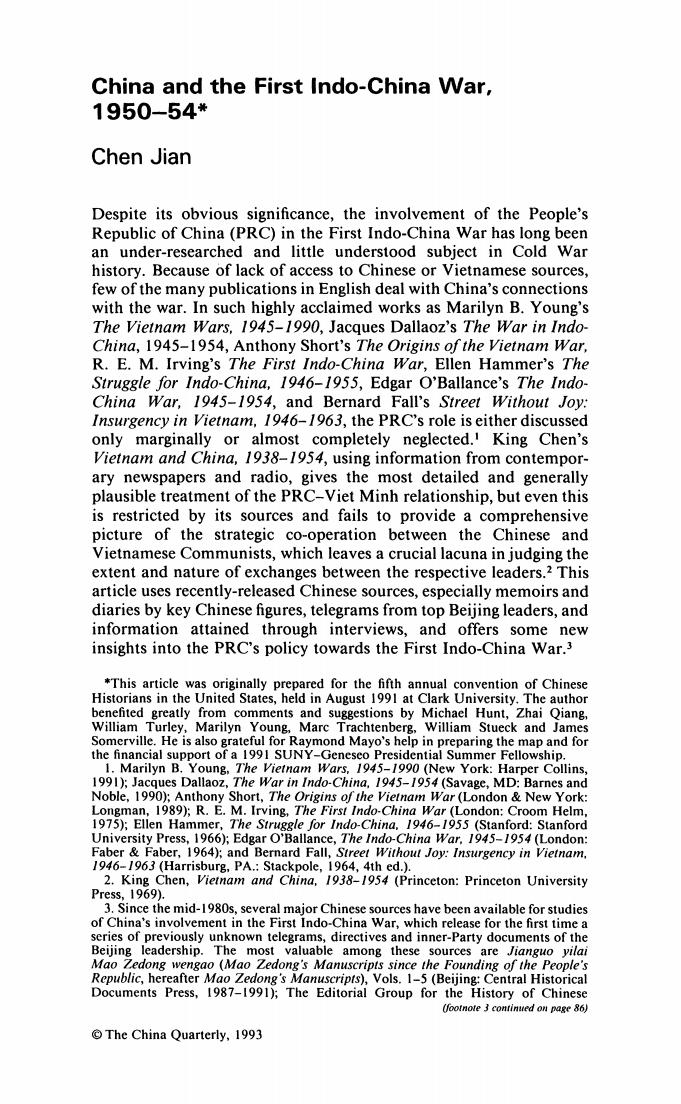
China and the First Indo-China War, 1950-54* Chen Jian Despite its obvious significance,the involvement of the People's Republic of China(PRC)in the First Indo-China War has long been an under-researched and little understood subject in Cold War history.Because of lack of access to Chinese or Vietnamese sources, few of the many publications in English deal with China's connections with the war.In such highly acclaimed works as Marilyn B.Young's The Vietnam Wars,1945-1990,Jacques Dallaoz's The War in Indo- China,1945-1954,Anthony Short's The Origins of the Vietnam War, R.E.M.Irving's The First Indo-China War,Ellen Hammer's The Struggle for Indo-China,1946-1955,Edgar O'Ballance's The Indo- China War,1945-1954,and Bernard Fall's Street Without Joy: Insurgency in Vietnam,1946-1963,the PRC's role is either discussed only marginally or almost completely neglected.King Chen's Vietnam and China,1938-1954,using information from contempor- ary newspapers and radio,gives the most detailed and generally plausible treatment of the PRC-Viet Minh relationship,but even this is restricted by its sources and fails to provide a comprehensive picture of the strategic co-operation between the Chinese and Vietnamese Communists,which leaves a crucial lacuna in judging the extent and nature of exchanges between the respective leaders.2 This article uses recently-released Chinese sources,especially memoirs and diaries by key Chinese figures,telegrams from top Beijing leaders,and information attained through interviews,and offers some new insights into the PRC's policy towards the First Indo-China War.3 *This article was originally prepared for the fifth annual convention of Chinese Historians in the United States,held in August 1991 at Clark University.The author benefited greatly from comments and suggestions by Michael Hunt,Zhai Qiang, William Turley,Marilyn Young,Marc Trachtenberg,William Stueck and James Somerville.He is also grateful for Raymond Mayo's help in preparing the map and for the financial support of a 1991 SUNY-Geneseo Presidential Summer Fellowship. 1.Marilyn B.Young,The Vietnam Wars,1945-1990 (New York:Harper Collins, 1991);Jacques Dallaoz,The War in Indo-China,1945-1954(Savage,MD:Barnes and Noble,1990);Anthony Short,The Origins of the Vietnam War (London New York: Longman,1989);R.E.M.Irving,The First Indo-China War (London:Croom Helm 1975);Ellen Hammer,The Struggle for Indo-China,1946-1955 (Stanford:Stanford University Press,1966);Edgar O'Ballance,The Indo-China War.1945-1954(London: Faber Faber,1964);and Bernard Fall,Street Without Joy:Insurgency in Vietnam. 1946-1963 (Harrisburg,PA.:Stackpole,1964,4th ed.). 2.King Chen,Vietnam and China,1938-1954 (Princeton:Princeton University Press,1969). 3.Since the mid-1980s,several major Chinese sources have been available for studies of China's involvement in the First Indo-China War,which release for the first time a series of previously unknown telegrams,directives and inner-Party documents of the Beijing leadership.The most valuable among these sources are Jianguo yilai Mao Zedong wengao (Mao Zedong's Manuscripts since the Founding of the People's Republic,hereafter Mao Zedong's Manuscripts),Vols.1-5(Beijing:Central Historical Documents Press,1987-1991);The Editorial Group for the History of Chinese (footnote 3 continued on page 86) The China Quarterly,1993

86 The China Quarterly The Indo-China area(Vietnam,Cambodia and Laos)and China are neighbours and the Chinese Communist Party(CCP)and Vietnamese Communists have historically had close connections.Early in the 1920s,Ho Chi Minh and other Vietnamese Communists initiated contacts with their Chinese comrades.Ho himself often came to China and could speak fluent Chinese;in the late 1930s and early 1940s he was even a member of the CCP-led Eighth Route Army.4 After the end of the Second World War,Ho's Indo-China Communist Partys led a national uprising and established the Democratic Republic of Vietnam (DRV)with Ho as president.When the French returned to re-establish control,Ho and his fellow Communists moved to mountainous areas to fight for independence,without support from the outside between 1946 and early 1950. The Chinese Communist victory in 1949 offered Vietnamese Communists a golden opportunity to be backed by a friendly PRC. Both sides were eager to establish close co-operation.In late 1949,the Indo-China Communist Party sent Hoang Van Hoan,a member of its central committee,to China to strengthen ties between the two parties.(Hoang later became the first DRV ambassador to the PRC, defected to China in the late 1970s and died there in 1991.)In early (footnote 3 continued from page 85) Military Advisers in Vietnam (ed.),Zhongguo junshi guwentuan yuanyue kangfa douzheng shishi (A Factual Account of the Participation of Chinese Military Advisory Group in the Struggle ofAssisting Vietnam and Resisting France,hereafter The CMAG in Vietnam)(Beijing:People's Liberation Army Press,1990);Luo Guibo,"Comrade Liu Shaoqi sent me to Vietnam,"in He Jinxiu et al.(eds.),Mianhuai Liu Shaoqi (In Commemoration of Liu Shaogi)(Beijing:Central Historical Documents Press, 1988);Chen Geng,Chen Geng riji (Chen Geng's Diaries),Vol.2 (Beijing:People's Liberation Army Press,1984);and Han Huanzhi and Tan Jinjiao et al,Dangdai zhongguo jundui de junshi gongzuo(The Military Affairs of the Contemporary Chinese Army,hereafter Contemporary Chinese Army)(Beijing:Chinese Academy of Social Sciences Press,1988).Although the Chinese authorities obviously allowed the declassification of these sources,usually on a selective basis,under the politically sensitive circumstance of a total confrontation between Beijing and Hanoi,the scholarly value of this fresh information should not be ignored.While a better scholarly balance could of course be reached with the releasing of the Vietnamese side of the story as well as a more complete declassification of Chinese documents,these new Chinese materials,combined with information from other sources,have created the basis for a new,though not conclusive,study of the PRC's involvement in the first Indo- China War. 4.For a Chinese account of Ho Chi Minh's connection with the Chinese Communist revolution from the 1920s to early 1940s,see Huang Zheng,Ho Zhiming he zhongguo (Ho Chi Minh and China)(Beijing:People's Liberation Army Press,1987),chs.1-4;see also Hoang Van Hoan,A Drop in the Ocean:Hoang Van Hoan's Revolutionary Reminiscences (Beijing:People's Liberation Army Press,1987),chs.3 and 4. 5.The Indo-China Communist Party was established in 1930;after February 1951, its name was changed to the Vietnamese Worker's Party (VWP or Dang Lao Dang Viet Nam). 6.Hoang Van Hoan,A Drop in the Ocean,pp.247-253
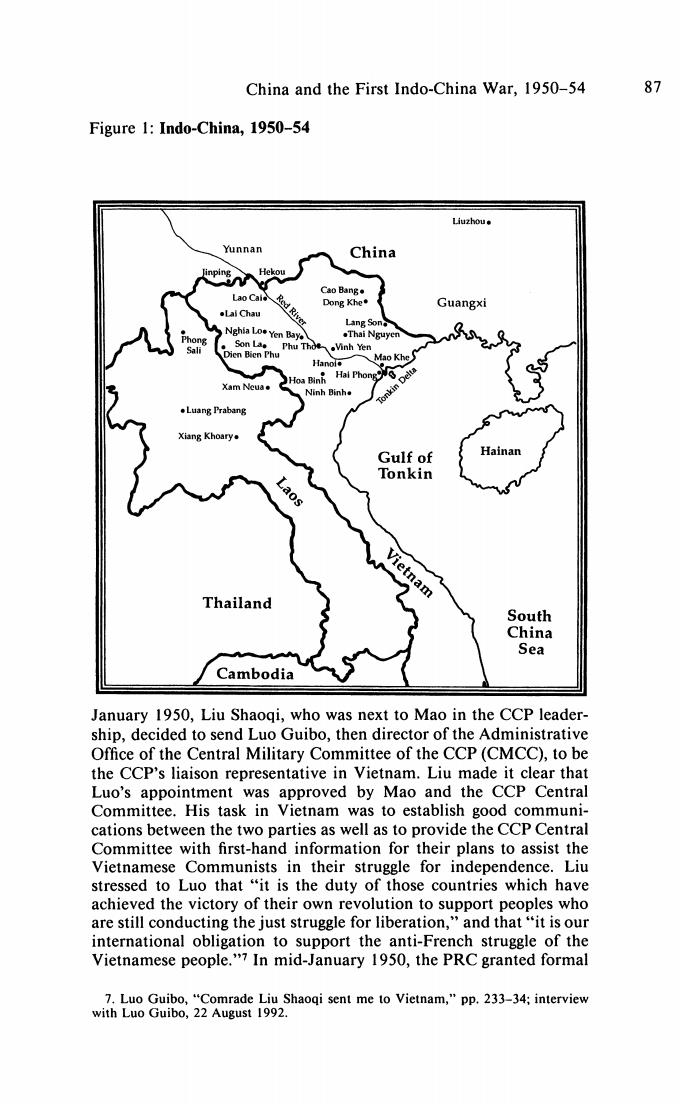
China and the First Indo-China War,1950-54 87 Figure 1:Indo-China,1950-54 Liuzhoue Yunnan China Hekou Ca0Bng◆ Lao Cai入 Dong Khe* Guangxi .Lai Chau Lang Son。 phon喀 Nghia Loe Yen Baye .Thai Nguyen Sali Son Lae Phu ThoeVinh Yen Dien Bien Phu Mao Khe Hoa Bin Hal Phong Xam Neua. Ninh Binh。 ●Luang Prabang Xiang Khoary. Gulf of Hainan Tonkin Laos Vietnam Thailand South China Sea Cambodia January 1950,Liu Shaoqi,who was next to Mao in the CCP leader- ship,decided to send Luo Guibo,then director of the Administrative Office of the Central Military Committee of the CCP(CMCC),to be the CCP's liaison representative in Vietnam.Liu made it clear that Luo's appointment was approved by Mao and the CCP Central Committee.His task in Vietnam was to establish good communi- cations between the two parties as well as to provide the CCP Central Committee with first-hand information for their plans to assist the Vietnamese Communists in their struggle for independence.Liu stressed to Luo that "it is the duty of those countries which have achieved the victory of their own revolution to support peoples who are still conducting the just struggle for liberation,"and that"it is our international obligation to support the anti-French struggle of the Vietnamese people."7 In mid-January 1950,the PRC granted formal 7.Luo Guibo,"Comrade Liu Shaoqi sent me to Vietnam,"pp.233-34;interview with Luo Guibo,22 August 1992
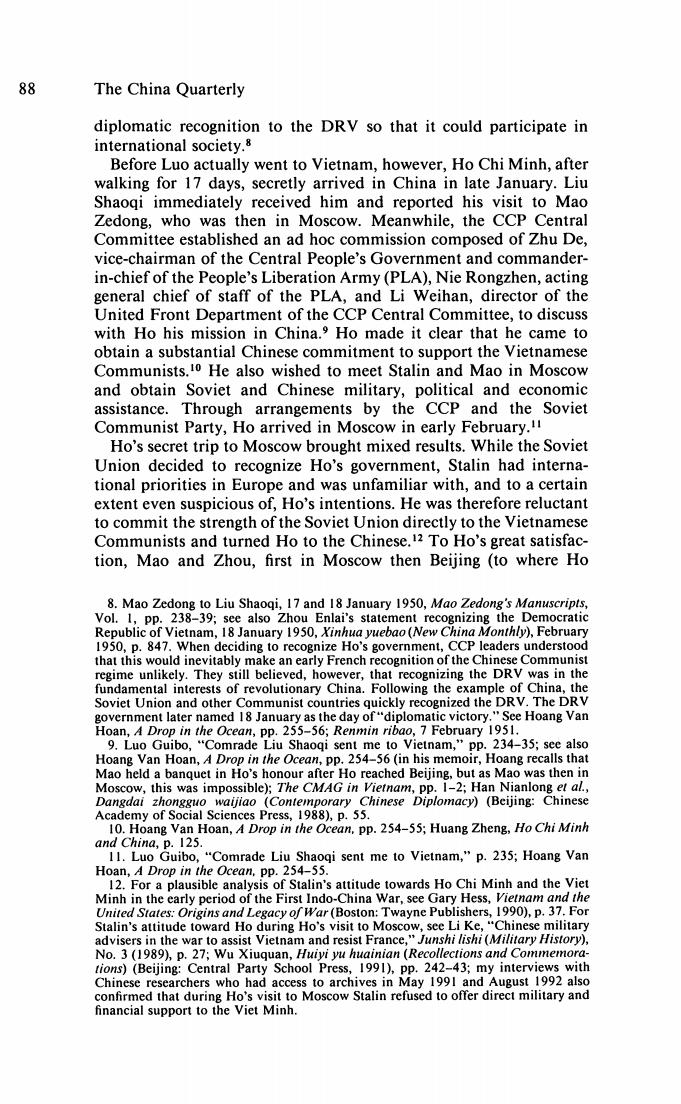
88 The China Quarterly diplomatic recognition to the DRV so that it could participate in international society.8 Before Luo actually went to Vietnam,however,Ho Chi Minh,after walking for 17 days,secretly arrived in China in late January.Liu Shaogi immediately received him and reported his visit to Mao Zedong,who was then in Moscow.Meanwhile,the CCP Central Committee established an ad hoc commission composed of Zhu De, vice-chairman of the Central People's Government and commander- in-chief of the People's Liberation Army(PLA),Nie Rongzhen,acting general chief of staff of the PLA,and Li Weihan,director of the United Front Department of the CCP Central Committee,to discuss with Ho his mission in China.Ho made it clear that he came to obtain a substantial Chinese commitment to support the Vietnamese Communists.10 He also wished to meet Stalin and Mao in Moscow and obtain Soviet and Chinese military,political and economic assistance.Through arrangements by the CCP and the Soviet Communist Party,Ho arrived in Moscow in early February.I Ho's secret trip to Moscow brought mixed results.While the Soviet Union decided to recognize Ho's government,Stalin had interna- tional priorities in Europe and was unfamiliar with,and to a certain extent even suspicious of,Ho's intentions.He was therefore reluctant to commit the strength of the Soviet Union directly to the Vietnamese Communists and turned Ho to the Chinese.12 To Ho's great satisfac- tion,Mao and Zhou,first in Moscow then Beijing (to where Ho 8.Mao Zedong to Liu Shaoqi,17 and 18 January 1950,Mao Zedong's Manuscripts, Vol.1,pp.238-39;see also Zhou Enlai's statement recognizing the Democratic Republic of Vietnam,18 January 1950,Xinhua yuebao(New China Monthly),February 1950,p.847.When deciding to recognize Ho's government,CCP leaders understood that this would inevitably make an early French recognition of the Chinese Communist regime unlikely.They still believed,however,that recognizing the DRV was in the fundamental interests of revolutionary China.Following the example of China,the Soviet Union and other Communist countries quickly recognized the DRV.The DRV government later named 18 January as the day of"diplomatic victory."See Hoang Van Hoan,A Drop in the Ocean,pp.255-56;Renmin ribao,7 February 1951. 9.Luo Guibo,"Comrade Liu Shaogi sent me to Vietnam,"pp.234-35;see also Hoang Van Hoan,A Drop in the Ocean,pp.254-56 (in his memoir,Hoang recalls that Mao held a banquet in Ho's honour after Ho reached Beijing,but as Mao was then in Moscow,this was impossible);The CMAG in Vietnam,pp.1-2;Han Nianlong et al., Dangdai zhongguo waijiao (Contemporary Chinese Diplomacy)(Beijing:Chinese Academy of Social Sciences Press,1988),p.55. 10.Hoang Van Hoan,A Drop in the Ocean,pp.254-55;Huang Zheng,Ho Chi Minh and China,p.125. 11.Luo Guibo,"Comrade Liu Shaoqi sent me to Vietnam,"p.235;Hoang Van Hoan,A Drop in the Ocean,pp.254-55. 12.For a plausible analysis of Stalin's attitude towards Ho Chi Minh and the Viet Minh in the early period of the First Indo-China War,see Gary Hess,Vietnam and the United States:Origins and Legacy ofWar (Boston:Twayne Publishers,1990),p.37.For Stalin's attitude toward Ho during Ho's visit to Moscow,see Li Ke,"Chinese military advisers in the war to assist Vietnam and resist France,"Junshi lishi(Military History), No.3(1989),p.27;Wu Xiuquan,Huiyi yu huainian (Recollections and Commemora- tions)(Beijing:Central Party School Press,1991),pp.242-43;my interviews with Chinese researchers who had access to archives in May 1991 and August 1992 also confirmed that during Ho's visit to Moscow Stalin refused to offer direct military and financial support to the Viet Minh

China and the First Indo-China War,1950-54 89 returned),promised that the CCP would do its best "to offer every military assistance needed by Vietnam in its struggle against France." When Ho returned to Vietnam he was certain that he could now rely on China's support.13 The CCP's attitude towards Vietnam was first and foremost the natural result of the Chinese Communist perception of an Asian revolution following the Chinese model.During the Chinese Commu- nist revolution,Mao and other CCP leaders had consistently seen it as part of a world proletarian revolutionary movement initiated by the Russian Bolsheviks.As it progressed,however,and differed from the Russian Revolution by concentrating largely on rural instead of urban areas,Mao and the CCP leadership had second thoughts on the nature and significance of their revolution.During 1948-49 they began to talk in terms of a much broader anti-imperialist Asian and world revolution.First,their model of revolution transcended China and offered an example of universal significance to other peoples struggling for national liberation.Secondly,the victory of the Chinese revolution represented the beginning of a new high tide of revolution movements of oppressed peoples in Asia and the world.Con- sequently,they believed it their duty to assist Communist revolution- aries and national liberation movements in other countries in order to promote an Asia-wide or even world-wide revolution.14 The CCP's policy of supporting the Vietnamese Communists was also consistent with Mao's "leaning to one side"approach,one of the corner-stones of the CCP's domestic and international policy in the early years of the PRC.Materials available now reveal that during Liu Shaoqi's secret visit to the Soviet Union in July and August 1949, Stalin strongly encouraged the Chinese to take a larger role in promoting revolutionary movements in East Asia.15 When Mao visited Moscow,the Chinese and the Soviets may have further divided the sphere of responsibility between them,leaving the support of Communist revolutionaries in Vietnam as China's duty.16 13.Huang Zheng,Ho Chi Minh and China,pp.125-26;Hoang Van Hoan,A Drop in the Ocean,pp.254-55;Contemporary Chinese Army.pp.520,576. 14.Liu Shaoqi,"Internationalism and nationalism,"Renmin ribao,7 November 1948;Liu Shaoqi's address on the Conference of Union of the Asian-Pacific region, Xinhua yuebao,No.2,Vol.1,p.440.See also Jin Zhonghua,"China's liberation and the world situation,"Shijie zhishi (World Afairs),Vol.20,No.1,17 June 1949;Du Ruo,"China's liberation and South-east Asia,"World Affairs,Vol.20,No.4,8 July 1949;"China's revolution and the struggle against colonialism,"People's China,16 February 1950,pp.4-5. 15.For a more detailed discusson of Liu Shaoqi's visit to Moscow,see Chen Jian, "The Sino-Soviet alliance and China's entry into the Korean War,"(Washington,D.C.: The Cold War International History Project of the Woodrow Wilson International Center for Scholars,December 1991),pp.9-15;see also Shi Zhe,"Random reflections of Comrade Liu Shaoqi,"Geming huiyilu(Revolutionary Memoirs),supplementary issue,No.I(October 1983),pp.110-11;Zhu Yuanshi,"Liu Shaoqi's secret visit to the Soviet Union in 1949,"Dangde wenxian (Party Historical Documents),No.3(1991), pp.76-77. 16.Interviews with Chinese researchers in May 1991;see also Li Ke,"Chinese military advisers,"p.27
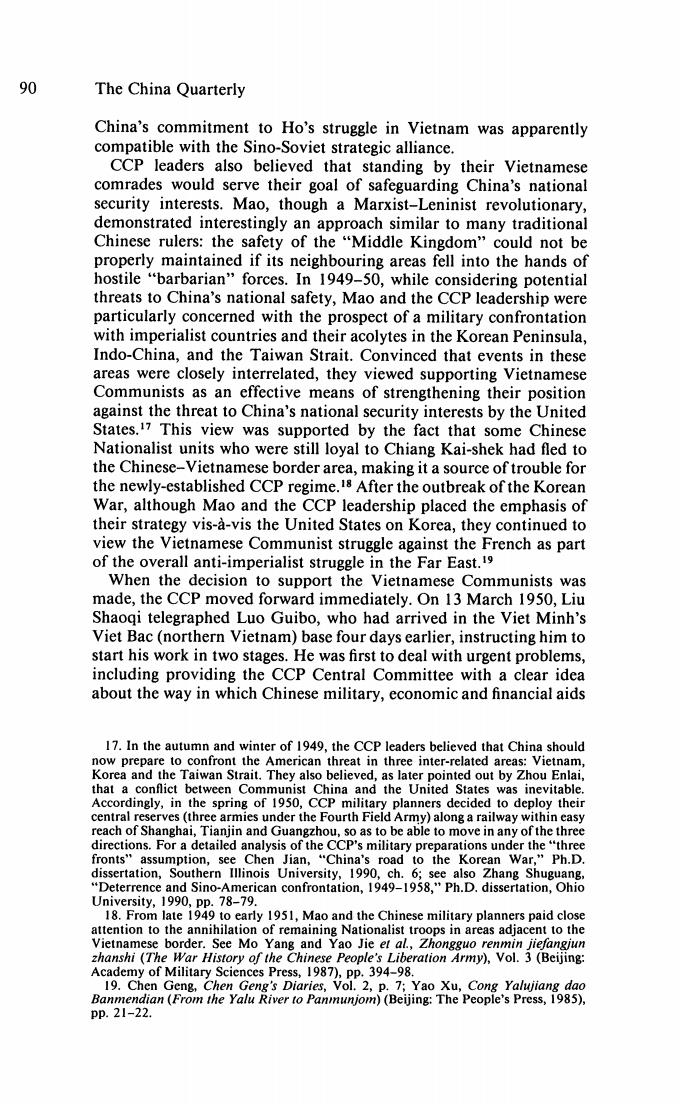
90 The China Quarterly China's commitment to Ho's struggle in Vietnam was apparently compatible with the Sino-Soviet strategic alliance. CCP leaders also believed that standing by their Vietnamese comrades would serve their goal of safeguarding China's national security interests.Mao,though a Marxist-Leninist revolutionary, demonstrated interestingly an approach similar to many traditional Chinese rulers:the safety of the "Middle Kingdom"could not be properly maintained if its neighbouring areas fell into the hands of hostile "barbarian"forces.In 1949-50,while considering potential threats to China's national safety,Mao and the CCP leadership were particularly concerned with the prospect of a military confrontation with imperialist countries and their acolytes in the Korean Peninsula, Indo-China,and the Taiwan Strait.Convinced that events in these areas were closely interrelated,they viewed supporting Vietnamese Communists as an effective means of strengthening their position against the threat to China's national security interests by the United States.17 This view was supported by the fact that some Chinese Nationalist units who were still loyal to Chiang Kai-shek had fled to the Chinese-Vietnamese border area,making it a source of trouble for the newly-established CCP regime.18 After the outbreak of the Korean War,although Mao and the CCP leadership placed the emphasis of their strategy vis-a-vis the United States on Korea,they continued to view the Vietnamese Communist struggle against the French as part of the overall anti-imperialist struggle in the Far East.19 When the decision to support the Vietnamese Communists was made,the CCP moved forward immediately.On 13 March 1950,Liu Shaoqi telegraphed Luo Guibo,who had arrived in the Viet Minh's Viet Bac(northern Vietnam)base four days earlier,instructing him to start his work in two stages.He was first to deal with urgent problems, including providing the CCP Central Committee with a clear idea about the way in which Chinese military,economic and financial aids 17.In the autumn and winter of 1949,the CCP leaders believed that China should now prepare to confront the American threat in three inter-related areas:Vietnam, Korea and the Taiwan Strait.They also believed,as later pointed out by Zhou Enlai, that a conflict between Communist China and the United States was inevitable. Accordingly,in the spring of 1950,CCP military planners decided to deploy their central reserves(three armies under the Fourth Field Army)along a railway within easy reach of Shanghai,Tianjin and Guangzhou,so as to be able to move in any of the three directions.For a detailed analysis of the CCP's military preparations under the"three fronts"assumption,see Chen Jian,"China's road to the Korean War,"Ph.D. dissertation,Southern Illinois University,1990,ch.6;see also Zhang Shuguang, "Deterrence and Sino-American confrontation,1949-1958,"Ph.D.dissertation,Ohio University,1990,pp.78-79. 18.From late 1949 to early 1951,Mao and the Chinese military planners paid close attention to the annihilation of remaining Nationalist troops in areas adjacent to the Vietnamese border.See Mo Yang and Yao Jie et al.,Zhongguo renmin jiefangjun zhanshi (The War History of the Chinese People's Liberation Army),Vol.3 (Beijing: Academy of Military Sciences Press,1987),pp.394-98. 19.Chen Geng,Chen Geng's Diaries,Vol.2,p.7;Yao Xu,Cong Yalujiang dao Banmendian (From the Yalu River to Panmunjom)(Beijing:The People's Press,1985), pp.21-22
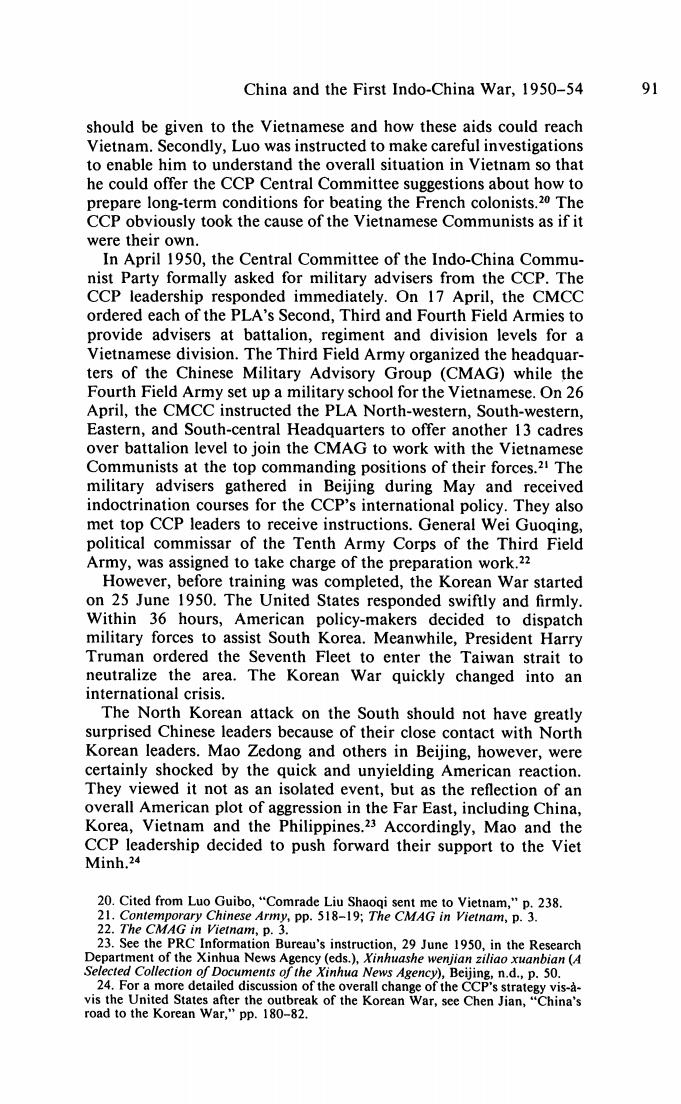
China and the First Indo-China War,1950-54 91 should be given to the Vietnamese and how these aids could reach Vietnam.Secondly,Luo was instructed to make careful investigations to enable him to understand the overall situation in Vietnam so that he could offer the CCP Central Committee suggestions about how to prepare long-term conditions for beating the French colonists.20 The CCP obviously took the cause of the Vietnamese Communists as if it were their own. In April 1950,the Central Committee of the Indo-China Commu- nist Party formally asked for military advisers from the CCP.The CCP leadership responded immediately.On 17 April,the CMCC ordered each of the PLA's Second,Third and Fourth Field Armies to provide advisers at battalion,regiment and division levels for a Vietnamese division.The Third Field Army organized the headquar- ters of the Chinese Military Advisory Group (CMAG)while the Fourth Field Army set up a military school for the Vietnamese.On 26 April,the CMCC instructed the PLA North-western,South-western, Eastern,and South-central Headquarters to offer another 13 cadres over battalion level to join the CMAG to work with the Vietnamese Communists at the top commanding positions of their forces.21 The military advisers gathered in Beijing during May and received indoctrination courses for the CCP's international policy.They also met top CCP leaders to receive instructions.General Wei Guoqing, political commissar of the Tenth Army Corps of the Third Field Army,was assigned to take charge of the preparation work.22 However,before training was completed,the Korean War started on 25 June 1950.The United States responded swiftly and firmly. Within 36 hours,American policy-makers decided to dispatch military forces to assist South Korea.Meanwhile,President Harry Truman ordered the Seventh Fleet to enter the Taiwan strait to neutralize the area.The Korean War quickly changed into an international crisis. The North Korean attack on the South should not have greatly surprised Chinese leaders because of their close contact with North Korean leaders.Mao Zedong and others in Beijing,however,were certainly shocked by the quick and unyielding American reaction. They viewed it not as an isolated event,but as the reflection of an overall American plot of aggression in the Far East,including China, Korea,Vietnam and the Philippines.23 Accordingly,Mao and the CCP leadership decided to push forward their support to the Viet Minh.24 20.Cited from Luo Guibo,"Comrade Liu Shaoqi sent me to Vietnam,"p.238. 21.Contemporary Chinese Army,pp.518-19;The CMAG in Vietnam,p.3. 22.The CMAG in Vietnam,p.3. 23.See the PRC Information Bureau's instruction,29 June 1950,in the Research Department of the Xinhua News Agency (eds.),Xinhuashe wenjian ziliao xuanbian(A Selected Collection of Documents of the Xinhua News Agency),Beijing,n.d.,p.50. 24.For a more detailed discussion of the overall change of the CCP's strategy vis-a- vis the United States after the outbreak of the Korean War,see Chen Jian,"China's road to the Korean War,"pp.180-82
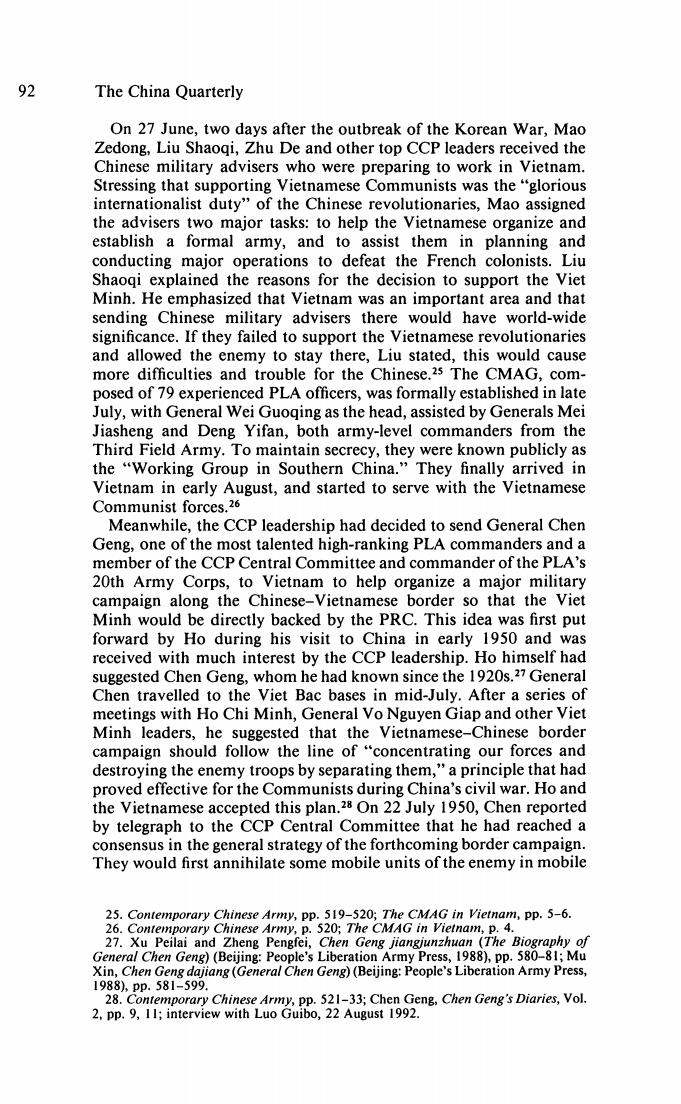
92 The China Quarterly On 27 June,two days after the outbreak of the Korean War,Mao Zedong,Liu Shaoqi,Zhu De and other top CCP leaders received the Chinese military advisers who were preparing to work in Vietnam. Stressing that supporting Vietnamese Communists was the "glorious internationalist duty"of the Chinese revolutionaries,Mao assigned the advisers two major tasks:to help the Vietnamese organize and establish a formal army,and to assist them in planning and conducting major operations to defeat the French colonists.Liu Shaoqi explained the reasons for the decision to support the Viet Minh.He emphasized that Vietnam was an important area and that sending Chinese military advisers there would have world-wide significance.If they failed to support the Vietnamese revolutionaries and allowed the enemy to stay there,Liu stated,this would cause more difficulties and trouble for the Chinese.25 The CMAG,com- posed of 79 experienced PLA officers,was formally established in late July,with General Wei Guoging as the head,assisted by Generals Mei Jiasheng and Deng Yifan,both army-level commanders from the Third Field Army.To maintain secrecy,they were known publicly as the "Working Group in Southern China."They finally arrived in Vietnam in early August,and started to serve with the Vietnamese Communist forces.26 Meanwhile,the CCP leadership had decided to send General Chen Geng,one of the most talented high-ranking PLA commanders and a member of the CCP Central Committee and commander of the PLA's 20th Army Corps,to Vietnam to help organize a major military campaign along the Chinese-Vietnamese border so that the Viet Minh would be directly backed by the PRC.This idea was first put forward by Ho during his visit to China in early 1950 and was received with much interest by the CCP leadership.Ho himself had suggested Chen Geng,whom he had known since the 1920s.27 General Chen travelled to the Viet Bac bases in mid-July.After a series of meetings with Ho Chi Minh,General Vo Nguyen Giap and other Viet Minh leaders,he suggested that the Vietnamese-Chinese border campaign should follow the line of "concentrating our forces and destroying the enemy troops by separating them,"a principle that had proved effective for the Communists during China's civil war.Ho and the Vietnamese accepted this plan.28 On 22 July 1950,Chen reported by telegraph to the CCP Central Committee that he had reached a consensus in the general strategy of the forthcoming border campaign. They would first annihilate some mobile units of the enemy in mobile 25.Contemporary Chinese Army,pp.519-520;The CMAG in Vietnam,pp.5-6. 26.Contemporary Chinese Army,p.520;The CMAG in Vietnam,p.4. 27.Xu Peilai and Zheng Pengfei,Chen Geng jiangjunzhuan (The Biography of Genera/Chen Geng)(Beijing:People's Liberation Army Press,1988),pp.580-81;Mu Xin,Chen Geng dajiang(General Chen Geng)(Beijing:People's Liberation Army Press, 1988),pp.581-599. 28.Contemporary Chinese Army,pp.521-33;Chen Geng,Chen Geng's Diaries,Vol. 2,pp.9,I1;interview with Luo Guibo,22 August 1992

China and the First Indo-China War,1950-54 93 operations and destroy a few small enemy strongholds.This would allow the Vietnamese to gain experience,stimulate and consolidate the momentum of their soldiers,and win the initiative,so that they would be ready for large-scale operations.Then they would start an offensive against Cao Bang,a small town on the Vietnamese-Chinese border,by adopting a strategy of"besieging the enemy to annihilate its relief force":instead of attacking the town directly,they would surround it and sweep out enemy strongholds in the peripheral areas one by one while at the same time attracting and destroying the enemy's reinforcements from Lang Son,and then seize Cao Bang. Chen believed that this strategy would guarantee the occupation of Cao Bang,"thus thoroughly changing the balance of power between the enemy and us in north-eastern and northern Vietnam."The CMCC approved Chen's plan in a telegram to him on 26 July.29 To guarantee that the strategy would be fully followed by Vietnamese units,Chinese military advisers were sent to the battalion,regiment and division levels of Vietnamese troops,with the approval of Ho. The Chinese also offered assistance in military equipment and other war materials to support the border campaign.In late March 1950,Luo Guibo asked the CCP Central Committee for military equipment,ammunition and communication equipment for 16,000 soldiers,to be used in military operations against Cao Bang and Lao Cai.30 From April to September 1950 the Chinese delivered more than 14,000 guns,1,700 machine guns,about 150 pieces of different types of cannons,2,800 tons of grain,and large amounts of ammunition, medicine,uniforms and communication equipment.31 The border campaign started on 16 September.After 48 hours of fierce fighting Vietnamese troops seized Dong Khe,a strategically important spot on Route Colonial Four which linked Cao Bang with the inner land of Vietnam,in the early morning of 18 September.The French command was surprised and dispatched a mobile army corps to Dong Khe while sending five battalions to attack Thai Nguyen,the location of the Viet Minh centre.Chen judged that their real purpose was to rescue their isolated units in Cao Bang.Instead of withdrawing troops from the Dong Khe-Cao Bang area to defend the Viet Minh centre,he strengthened pressure over Cao Bang.On 3 October,as he had predicted,French troops retreated from the Dong Khe and Cao Bang area and moved south,to fall into his trap in nearby mountains. In response to Chen's report about the situation,Mao sent him a telegram on 6 October to give him clear instructions on the final stage of the campaign: It is correct for you to plan first to concentrate your main forces on eliminating the enemy troops south-west of Dong Khe who have now been surrounded by us and then,according to the situation,surround and 29.Contemporary Chinese Army,pp.522-23. 30.The CMAG in Vietnam,p.44. 31.Ibid.pp.44-46;Mu Xin,General Chen Geng,pp.590-93